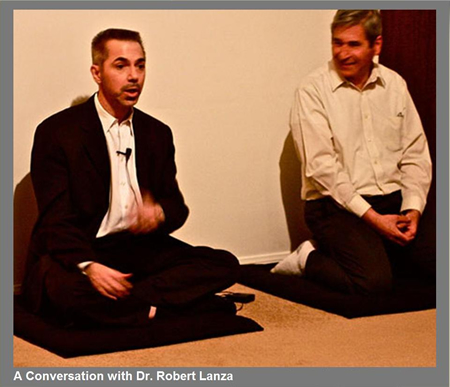“… Robert Lanza’s work is a wake-up call to all of us”
—David Thompson, Astrophysicist, NASA’s Goddard Space Flight Center
“The heart of [biocentrism], collectively, is correct…So what Lanza says in this book is not new. Then why does Robert have to say it at all? It is because we, the physicists, do NOT say it–or if we do say it, we only whisper it, and in private–furiously blushing as we mouth the words. True, yes; politically correct, hell no! Bless Robert Lanza for creating this book, and bless Bob Berman for not dissuading friend Robert from going ahead with it…Lanza’s remarkable personal story is woven into the book, and is uplifting. You should enjoy this book, and it should help you on your personal journey to understanding.”
—Richard Conn Henry, Professor of Physics and Astronomy, Johns Hopkins University
“It is genuinely an exciting piece of work…and coheres with some of the things biology and neuroscience are telling us about the structures of our being. Just as we now know that the sun doesn’t really move but we do (we are the active agents), so it is suggesting that we are the entities that give meaning to the particular configuration of all possible outcomes we call reality.”
—Ronald Green, Eunice & Julian Cohen Professor and Director, Ethics Institute, Dartmouth College
“[Biocentrism] takes into account all the knowledge we have gained over the last few centuries…placing in perspective our biologic limitations that have impeded our understanding of greater truths surrounding our existence and the universe around us. This new theory is certain to revolutionize our concepts of the laws of nature for centuries to come.”
—Anthony Atala, renowned scientist, W.H. Boyce Professor, Chair, and Director of the Institute for Regenerative Medicine, Wake Forest University School of Medicine
“Having interviewed some of the most brilliant minds in the scientific world, I found Dr. Robert Lanza’s insights into the nature of consciousness original and exciting. His theory of biocentrism is consistent with the most ancient traditions of the world which say that consciousness conceives, governs, and becomes a physical world.”
—Deepak Chopra, Bestselling Author, one of the top heroes and icons of the century
“It’s a masterpiece…combines a deep understanding and broad insight into 20th century physics and modern biological science; in so doing, he forces a reappraisal of this hoary epistemological dilemma…Bravo”
—Michael Lysaght, Professor and Director, Center for Biomedical Engineering, Brown University
“Now that I have spent a fair amount of time the last few months doing a bit of writing, reading and thinking about this, and enjoying it and watching it come into better focus, And as I go deeper into my Zen practice, And as I am about half way through re-reading Biocentrism, My conclusion about the book Biocentrism is: Holy shit, that’s a really great book!
—Ralph Levinson, Professor, University of California, Los Angeles
